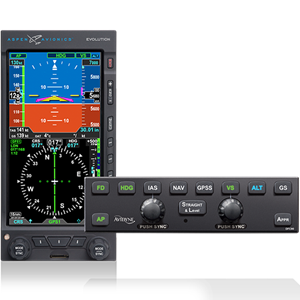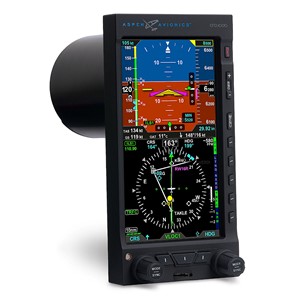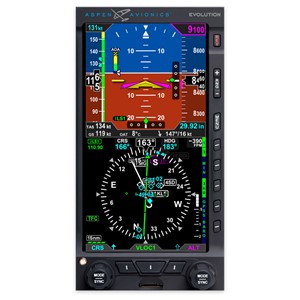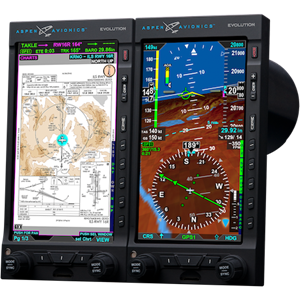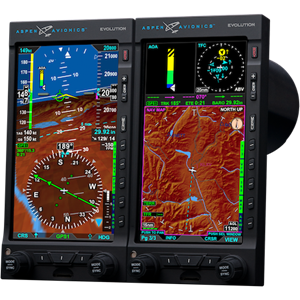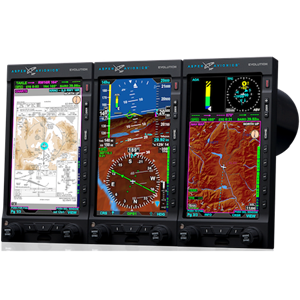The DFC90 adds the precision of an attitude-based flight control system and Avidyne’s innovative, safety-enhancing Envelope Protection capability.
The DFC90 has all the standard vertical and lateral modes of operation of a turbine-class autopilot system, including Flight Director (FD), Altitude Hold (ALT), Airspeed Hold (IAS), Vertical Speed Hold (VS), Heading (HDG), and Navigation (NAV, APPR, LOC/GS, GPSS). Customers upgrading from the STEC 55X will notice several major performance and feature improvements (see list under the Features tab).
There are many other improvements, such as a dedicated Vertical Speed knob, pitch hold mode, wide autopilot engagement, additional annunciations in PFD 8.0, a dedicated GPSS button, automatic Back Course Approach selection, multiple color annunciations to indicate armed and active states, intercept mode annunciations, and Avidyne’s hallmark ease of use.
For envelope protection, available lift and speed margin are calculated constantly in the background whenever any mode, including Flight Director modes, are in operation. As the aircraft approaches stall, the autopilot acts unobtrusively to gradually reduce maximum bank and Vertical Speed just enough to keep the wing flying, while annunciating the condition to the pilot. As a result, departure from controlled flight is prevented with the least obtrusive impact on achieving mission level objectives like navigation, climb or approach. Overspeed is handled similarly, with anticipation and minimal but effective inputs. In Flight Director modes, all these actions appear as guidance cues with corrections blended into the "V-bar" commands.
Customers upgrading from the STEC 55X will notice several major performance and feature improvements including:
- Attitude-Based - Greatly improved stability due to the use of attitude data to control the autopilot inner control loops. This is particularly evident and important when tracking an ILS to minimums in windy conditions.
- EP™ - Avidyne’s Envelope Protection. Prevents autopilot-induced stalls and overspeeds—which have previously been a major contributing factor in GA accidents—when the autopilot is engaged. EP also provides visual and aural warnings to the pilot.
- EA™ - Avidyne’s Envelope Alerting. Available lift and speed margins are calculated constantly in the background, providing visual and aural warnings to the pilot when the aircraft is nearing its normal flight parameters, even when the autopilot is off.
- “Straight & Level” Button – Recovers the aircraft from unusual attitudes. Overrides all autopilot modes and levels the aircraft in both pitch and roll from a wide range of capture attitudes for an added measure of safety. S&L button provides added peace of mind—especially for non-pilot in right seat (i.e. Cirrus Parachute).
- Indicated Airspeed Hold (IAS) - New vertical mode includes a dedicated Airspeed knob and a new airspeed bug on the PFD. Provides constant speed flight level changes.
- Enhanced Fight Director capability of the DFC90 is vastly improved and greatly improves the ability to hand-fly approaches.
- Synchronized Heading Bug – With the DFC90, turns are commanded in correlation with the spin of the heading knob. In other words, you can make the autopilot do a right-hand 270 degree turn if you spin the heading knob right 270 deg.
There are many other improvements, such as a dedicated Vertical Speed knob, pitch hold mode, wide autopilot engagement, additional annunciations in PFD 8.0, a dedicated GPSS button, automatic Back Course Approach selection, multiple color annunciations to indicate armed and active states, intercept mode annunciations, and Avidyne’s hallmark ease of use.
- Dimensions: 6.25"W x 1.5"H x 10.6"D (159 x 38 x 279 mm)
- Weight: 2.02 lbs (0.92 kg)
- TSOs: TSO-C9c Automatic Pilots, TSO-C52b Flight Director Equipment



